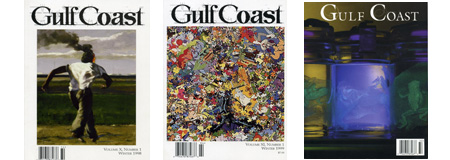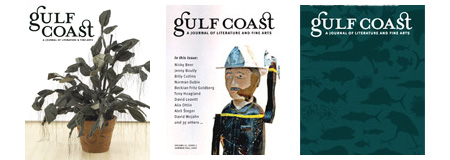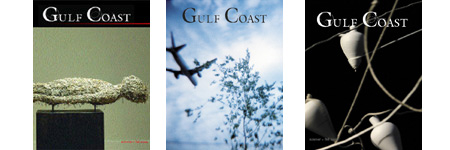I Wish My Writing Degree Only Cost $5
Zachary Martin
Oct 06, 2012
Twenty-six years. That's how long Gulf Coast has been publishing the very best fiction, nonfiction, poetry, and visual art. A lot has changed since Donald Barthelme and Philip Lopate founded the journal in 1986: the rise of internet commerce and the e-reader, the rapid growth of creative writing MFA programs, the digitization of libraries, and the conglomeration of publishing companies. After all these sea changes, though, Gulf Coast is still here and stronger than ever. The simple fact is that no matter how much technology advances, writing was, is, and always will be about craft and attention to the art. That's what makes literature endure, not how many digital platforms it's available on. Looking back through past issues, it's absolutely incredible to realize how many great demonstrations of craft there are in the journal--in the poems, stories, essays, and art--but also how much great craft advice there is in the interviews, conversations, and roundtables with contemporary masters, writers like Czeslaw Milosz, Amy Hempel, David Leavitt, Junot Díaz, Barry Hannah, and Seamus Heaney. Many of these discussions of craft have never been reprinted anywhere else. Issue 10.1 features a roundtable between Edward Hirsch, Philip Levine, and C.K. Williams on the long line in poetry and how it saved their lives. ??Issue 11.2 features an interview with Alan Hollinghurst on writing in the age of AIDS. ?Issue 15.2 features multiple encounters with Czeslaw Milosz on the immodesty of contemporary poetry.
Why are these interviews so important, and why do they continue to remain vital, years after they were originally published? Perhaps Barry Hannah's chat with Andrew Brininstool, published in Gulf Coast 21.1, provides the best answer: "When I was a young writer I got a great deal out of interviews with the greats: Faulkner and Hemingway and O'Connor. They're probably good for young people, young writers like you."
Issue 10.1 features a roundtable between Edward Hirsch, Philip Levine, and C.K. Williams on the long line in poetry and how it saved their lives. ??Issue 11.2 features an interview with Alan Hollinghurst on writing in the age of AIDS. ?Issue 15.2 features multiple encounters with Czeslaw Milosz on the immodesty of contemporary poetry.
Why are these interviews so important, and why do they continue to remain vital, years after they were originally published? Perhaps Barry Hannah's chat with Andrew Brininstool, published in Gulf Coast 21.1, provides the best answer: "When I was a young writer I got a great deal out of interviews with the greats: Faulkner and Hemingway and O'Connor. They're probably good for young people, young writers like you."
 Issue 21.1 features an interview with Barry Hannah on the difficulties of writing through illness and the similarities between music and fiction. Issue 21.2 features an interview on the craft of novel writing with David Leavitt and a postscript by interviewer Irene Keliher about the new frontiers of queer fiction. Issue 23.1 features a roundtable on political poetry with Nick Flynn, Brenda Hillman, Dorianne Laux, Fred Marchant, Laura Mullen, and Patricia Smith.
It's good for you. Hannah's answer is one reason why I've never felt the term "periodicals" could be adequately used to label literary journals. "Periodical" seems to connote a kind of ephemeral quality that applies to magazines like Us Weekly and People: contained within their pages is information that will be relevant for a limited period of time. But the brilliant lessons on the art and craft of writing that Gulf Coast has collected over the last twenty-six years will be relevant long past when any of us reading this are alive.
Interspersed in this blog and below are some of my favorite interviews, conversations, and roundtables from back issues of Gulf Coast and, if you're interested in gobbling up some craft lessons for yourself, we're offering back issues for sale for just $5 for a limited time only. Just use our order page and enter the coupon code "ISS" when checking out. Order a few issues; it'll still be the cheapest master class in writing you'll ever find.
Issue 21.1 features an interview with Barry Hannah on the difficulties of writing through illness and the similarities between music and fiction. Issue 21.2 features an interview on the craft of novel writing with David Leavitt and a postscript by interviewer Irene Keliher about the new frontiers of queer fiction. Issue 23.1 features a roundtable on political poetry with Nick Flynn, Brenda Hillman, Dorianne Laux, Fred Marchant, Laura Mullen, and Patricia Smith.
It's good for you. Hannah's answer is one reason why I've never felt the term "periodicals" could be adequately used to label literary journals. "Periodical" seems to connote a kind of ephemeral quality that applies to magazines like Us Weekly and People: contained within their pages is information that will be relevant for a limited period of time. But the brilliant lessons on the art and craft of writing that Gulf Coast has collected over the last twenty-six years will be relevant long past when any of us reading this are alive.
Interspersed in this blog and below are some of my favorite interviews, conversations, and roundtables from back issues of Gulf Coast and, if you're interested in gobbling up some craft lessons for yourself, we're offering back issues for sale for just $5 for a limited time only. Just use our order page and enter the coupon code "ISS" when checking out. Order a few issues; it'll still be the cheapest master class in writing you'll ever find.
 ?Issue 16.2 features a conversation with Seamus Heaney on his famous poem "Digging," Ashbery, Yeats, and the disadvantages of being an Irish poet. ?Issue 19.1 features an interview with Ander Monson on the ends and means of experimental nonfiction. ??Issue 20.2 features an interview with Vikram Chandra discussing the problems of workshopping a novel and what it was like to learn craft from John Barth and Donald Barthelme.
?Issue 16.2 features a conversation with Seamus Heaney on his famous poem "Digging," Ashbery, Yeats, and the disadvantages of being an Irish poet. ?Issue 19.1 features an interview with Ander Monson on the ends and means of experimental nonfiction. ??Issue 20.2 features an interview with Vikram Chandra discussing the problems of workshopping a novel and what it was like to learn craft from John Barth and Donald Barthelme.

Comments (1)
Jenny:
Oct 30, 2012 at 07:53 PM
I was thinking of buying quite a few of these. However, it looks like the order from will only accommodate ordering two back issues at once. Is that right? Is there an easy way to order more than two, or do I just need to go through that order form process several times?
Add a Comment